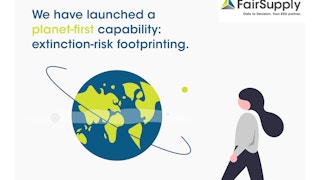
The IBAT Alliance are very pleased to announce a new collaboration with FairSupply, where data from the Species Threat Abatement and Restoration Metric (STAR) have been used in a world-first for extinction risk footprinting across supply chains.
What is extinction-risk footprinting?
Biodiversity extinction risk often results from consumption decisions that occur far from the geographical location of species’ impacts. To footprint that risk - that is, to assess the impact of a value chain, requires a methodology that connects each transaction within a supply chain to every other transaction and a metric that quantifies the impact of these transactions.
FairSupply’s brand new extinction-risk footprinting offering has solved this puzzle. The new offering is the brainchild of Amanda Irwin’s (Head of ESG Research at FairSupply) pioneering research published in her doctoral thesis and in Nature: Scientific Reports: Quantifying and categorising national extinction-risk footprints.
Resolving the issue of limited spatially-explicit supply chain data
Combining STAR with global data on economic transactions has enabled visibility into extinction risk impact along a company’s entire value chain to Tier 10 and beyond, identifying the locations and species most impacted by each industry. Extinction-risk footprinting builds out FairSupply’s existing suite of ESG risk assessment offerings which include modern slavery, scope 3 GHG emissions, land and water usage footprinting. More information can be seen in their new report: Understanding biodiversity loss and how your organisation might be implicated in it.
The rich data curated in the IUCN Red List of Threatened Species was used to generate a non-normalised Species Threat Abatement and Restoration (nSTAR) metric reapplying the methodologies of the STAR publication by Mair et al., 2021. This converts the extinction risk classification of each species, and the scope and severity of the threats acting on it, into a numeric value which provides an indicator of how likely that species is to move closer to extinction. The nSTAR value for each species, economic sector, and country can be calculated, providing the underlying metric used within FairSupply’s Integrated Assessment Engine.
Learn more at our webinar
IBAT and FairSupply will be formally announcing this powerful new tool at a free launch webinar on 23rd June, which will be broadcast twice.
Our speakers will be Ed Ellis - Manager of IBAT, Kimberly Randle - co-founder and CEO of FairSupply, and Amanda Irwin - Head of ESG Research at FairSupply (speaker biographies here).
Publish your content with EB Publishing
It's about who you reach. Get your news, events, jobs and thought leadership seen by those who matter to you.











